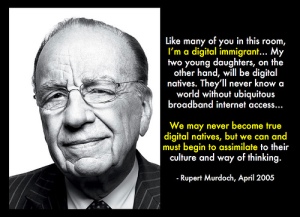Labels are great ways to organize. They help us to store messy things in neat packages. Labels are great for files and boxes, but not so great for people.
Jeff Foxworthy used our love of labels to build a comedy brand: “You might be a Red-Neck if . . .” Now, my sons might be Red-Necks. They hunt and fish. We have a growing deer head collection instead of fine art in my living room. However, this label of “Redneck” limits the description of these intelligent young men who have a range of skills and abilities. In the same way, labeling them as digital natives because they fit the age range is also too simple.
My sons know how to play on the internet and find items to buy. They can post on Facebook and text with amazing dexterity, but they do not know how to search beyond Google or how to create a multimodal presentation beyond Power Point.
Some academics embraced the ill-fitting label of “digital native” to the point of following Prensky’s panicked advice to change education. However, Eszter Hargittai in her article,”Digital Na(t)ives? Variation in Internet Skills and Uses among Members of the ‘Net Generation’” suggests:
My concern is that by embracing the ill-defined notion of “digital natives,” those who teach this generation (and subsequent generations) will assume levels of expertise and experience–among all of their students–that simply don’t exist in such an evenly distributed way. As a result, opportunities for teaching critical skills will be lost.
Labels used on groups of people are not definitive. Prensky defined digital natives as those born after 1980. The techno-blog, Websimple simplifies the generalization: “Why the 1980 demarcation? Why not 1990? Why not 2004 (the year Facebook launched)? What about all those super-users over the age of 30, or the technophobic twenty-year-olds?” Labels limit – especially if they are misplaced.
Digital native may be a 65 year-old professor who knows more about writing in the digital environment than her 18 year-old first year student. The “younger generation” may be more comfortable with technology, but they may also lack digital literacy of someone older.
Just for the fun of it from Websimple:
“You might be a digital native if . . . ”
- If you have ever texted someone to come to dinner who was in the next room…you might be a digital native.
- If you think flirting should be done in 140 characters…you might just be a digital native.
- If you ever have uttered the phrase “I wonder if there’s an app for that?”… you might be a digital native.
- If you check your phone instead of your wrist for the time…you might be a digital native.
- If you get more “wall posts” than post cards on your birthday . . .might be a digital native.
- If you use acronyms like OMG and LOL, even when you are talking to someone…you might be a digital native.
- If you have ever checked to see if you’re in a relationship by looking at someone’s Facebook status….you might be a digital native.




